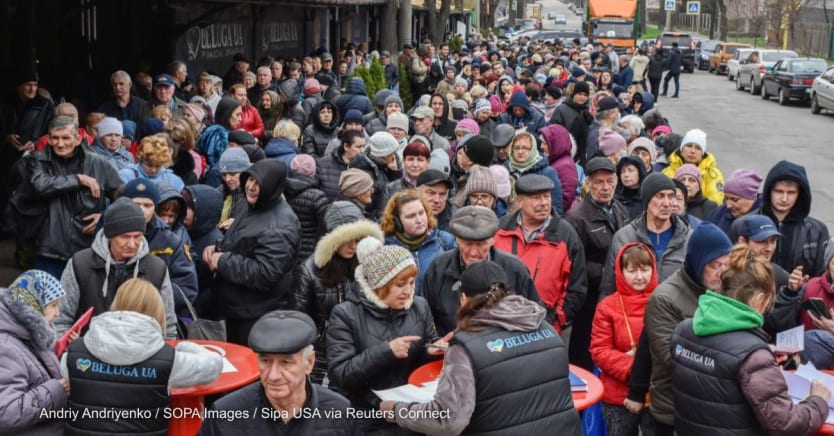
The U.S. Senate passed a $95 billion emergency funding bill to support Ukraine and Israel on Tuesday and while much of it is military financing, about $10 billion is for humanitarian aid.
The bill, which passed with a bipartisan majority in the Senate, now heads to the U.S. House of Representatives where its future is very much up in the air. Republican House Speaker Mike Johnson has said this version of the legislation isn’t acceptable to him and he’s unlikely to even bring it up for a vote. Odds are, if voted on, it could pass, but he is under pressure to block the legislation from some in his party who don’t support additional Ukraine funding and some who want to tie it to immigration reform.
We “implore the House to pass this funding expeditiously,” Kate Phillips-Barrasso, vice president of global policy and advocacy at Mercy Corps, said in a statement. “These resources will be vital both to save lives and prevent further global backsliding on poverty reduction, particularly in places like Ukraine, Gaza, and Sudan, where the responses have already fallen dramatically short of what’s needed.”
Mercy Corps was one of more than 60 NGOs that issued a joint statement last week supporting the humanitarian assistance funding in the Senate bill, calling it “necessary and prudent.”
“Global humanitarian needs are at near record high as conflict, hunger, and displacement impact countless lives around the world. These supplemental funds will save lives, demonstrate U.S. leadership, and foster a more secure world; nevertheless, they cannot be a substitute for strong, consistent base appropriations,” said the statement. Annual funding for this year is still in limbo as Congress has repeatedly delayed passing funding bills.
The NGO statement also raised concerns about certain policy provisions that would “impact the lives of people we work with and require additional analysis and debate” though it didn’t specify which issues.
Among the major policy provisions relating to humanitarian aid is a prohibition that any of the funding should go to UNRWA, the U.N. agency for Palestinian refugees, and additional oversight and reporting requirements for money to Gaza to ensure U.S. aid dollars are not being diverted to Hamas. The U.S. government recently suspended funding to the agency pending an investigation into employees accused of participating in the Oct. 7 Hamas massacre of 1,200 people in Israel.
UN relief workers accused of participation in Hamas massacre
Revelations tarnish the United Nations' image, risking broader U.S. cuts to the world body's humanitarian funds.
Here’s where the money would go:
• $5.6 billion to USAID to address humanitarian needs as a result of the conflicts.
• Nearly $7.9 billion to the U.S. Department of State’s economic support fund, most of which is earmarked to support Ukraine, with about $50 million directed to address food security.
• Some $3.5 billion to address humanitarian needs and support refugees in response to these conflicts.
• $250 million to the World Bank IDA special program to enhance its crisis response window.
• The ability to use unobligated funds to cover the cost of up to $21 billion in loans to the International Monetary Fund’s Poverty Reduction and Growth Trust.
• $39 million for USAID operating expenses, and $13 million for USAID’s Office of Inspector General.
• $25 million from the Office of Transition Initiatives, to assist Ukraine and countries impacted by the conflict there.








